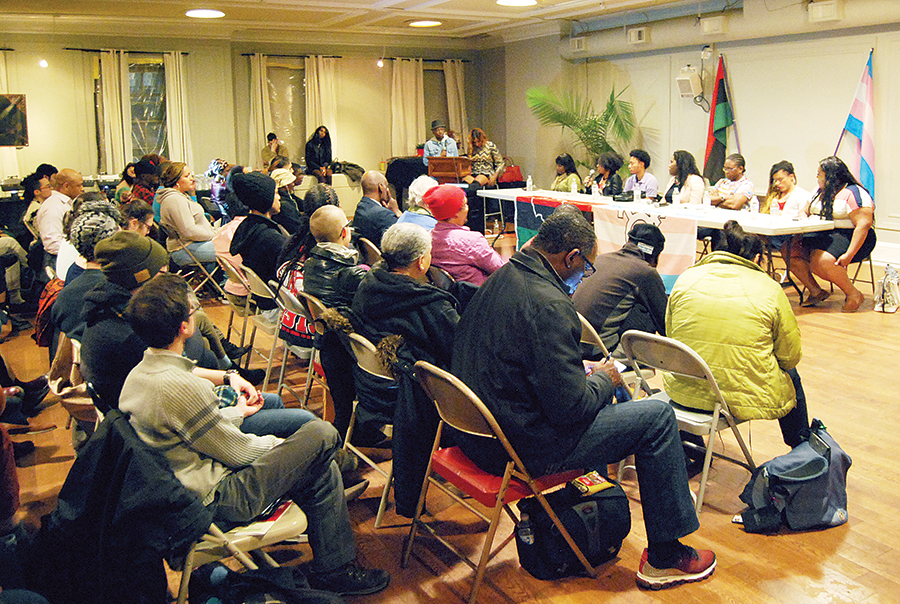In honor of Black History Month, members of the city’s black trans community gathered to host a panel discussion on their struggles and triumphs.
The Trans Equity Project, the TransMasculine Advocacy Network (TMAN) and L’amour last week hosted “Philly Black Trans History: A Multigenerational Panel Discussion” at the William Way LGBT Community Center.
The catered event featured several panelists, including Lisa Thompson, Sam Marks, Ja’Nae Taylor, Reno Wright, Bri Golphin, Cory Taylor and Tatyana Ali Woodard.
Trans Equity Project co-coordinator Christian Lovehall kicked off the Feb. 26 event with spiritual drumming by Karen Smith, a local community member.
“It is an opportunity for LGBTQIA individuals to learn about Philadelphia’s black trans history,” Lovehall said. “This gathering allows community members to connect with local leaders within our trans communities to better understand the life experiences of black trans individuals in our city and to challenge assumptions and stereotypes.”
Prior to the discussion, Lovehall took a moment to honor ancestors and community members who are no longer present, but whose legacy inspires the community. While Smith passionately drummed along, he spoke.
“Tonight is a night to call out all those who came before us. Tonight we honor our ancestors, spirits — we are honored to uplift their achievements and contributions this evening,” Lovehall said.
Following the commemoration, the panelists took the microphone.
Wright, a trans man, is a published author and an advocate. He spoke about being on “The Jerry Springer Show,” what it’s like to be a proud trans man and the strength in recovery from addiction.
Wright was the first African-American trans man to appear on television when he came out on Springer’s show many years ago.
“It was liberating and empowering. I was beaten to my chest for a very long time, but was in my early 20s and for me, I had been hiding who I was and how I really felt for over two decades, most of my life,” he said.
Wright expressed how the opportunity changed his life and allowed him to come out and be cheered on for whom he really was.
But while it was liberating, coming out also created obstacles and safety fears.
“Doing that was a brand-new experience for me,” Wright recalled. “I had never had anybody cheer for me like that before in my life. At the same time, on the other hand, I had exposed myself nationally. Everybody had seen me, knew who I was and I didn’t know who everybody else was.
“It put me in a very vulnerable, tricky kind of position as far as safety out on the street. It really was, at times, a very crippling vulnerability. But in all honesty, I would not change that experience in my life.”
Wright also talked about recovery and gave advice to anyone else who also chose a sober lifestyle.
“Recovery is a real and serious thing for me. I am a person who is in recovery and I’m not ashamed to say I’m in recovery. I don’t believe in stigma associated with recovery. My higher power delivered me from something I couldn’t deliver myself from,” he said.
Wright also addressed “owning yourself” and the importance of identity in recovery.
“I believe it is important that we research our origin. Peel back the layers of our heritage, our ethnicity, to know you want to assimilate where you set your goals and go after them hard. Do you want to decide what you want to do with your life, or do you want your life to be decided for you?”
Other panelists discussed overcoming struggles in culture and race.
Golphin, who is non-binary, spoke on experiences as an African American.
“There are still struggles. We are battling issues of racism. There’s still more work to be done. It also means to have incredible strength: For those who are not a person of color, it is not easy to walk the streets as a person of color,” said Golphin.
Tyler, a trans woman, relayed an early life experience that impacted her forever.
She was early on in her transition and was looking for an apartment.
“I went through the whole process, called [the landlords] and set it up. Everything was good. They were really gung-ho on giving me the apartment,” she said.
However, things changed when it came to providing documentation.
“My name on the paperwork wasn’t the name I had given them through the process. A week or so passed and there was no follow-up,” said Tyler, adding she had provided the security deposit and was waiting for final instructions.
After not hearing back, she contacted a friend who knew the couple to find out what happened.
“Basically, what was said was that they would not have felt comfortable renting to me because I had two different names. For me, that hurt. That was disheartening for me. I went on [and] proceeded elsewhere, but that always plays in my mind. I don’t have to disclose my life to you. It has nothing to do with renting an apartment. I was qualified and there was a bias they had.”
Other panelists also shared experiences and the battles they overcame, with the aim of empowering the community.
